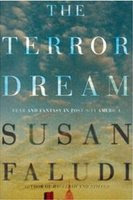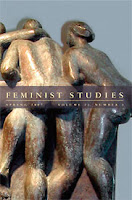 The ladies of Bitch magazine are currently touring the East Coast…I’m off to a welcome party. Meanwhile, on the topic of feminist responses to pop culture (which is what Bitch does so well), I was thrilled to read Faludi’s deconstruction of the opt-out media frenzy, from Sylvia Ann Hewlett (2001) to Lisa Belkin (2003) to Louise Story (2005). Basically, what most sociologists and economists have been saying all along. For those of you looking for a cheat sheet, it’s on pages 141-45 of The Terror Dream.
The ladies of Bitch magazine are currently touring the East Coast…I’m off to a welcome party. Meanwhile, on the topic of feminist responses to pop culture (which is what Bitch does so well), I was thrilled to read Faludi’s deconstruction of the opt-out media frenzy, from Sylvia Ann Hewlett (2001) to Lisa Belkin (2003) to Louise Story (2005). Basically, what most sociologists and economists have been saying all along. For those of you looking for a cheat sheet, it’s on pages 141-45 of The Terror Dream.


Like Dee, I’m really looking forward to reading Susan Faludi’s The Terror Dream, which I believe is the first book to deal in depth with the psycho/sexual political/domestic alchemical reaction we had as a nation to 9/11. Her thesis, that we regressed to a kind of frontier mentality wherein men are the defenders of women, hearth, and home, seems broadly correct; but I may take issue with some of her specifics, based on what I’ve read leading up to the book release.
Dee, in her post below on The Terror Dream, makes a case for authentic sentiment and emotion around some of the mythic tropes proposed by Faludi. As for myself, I personally don’t recall any gender scripting by the media in the immediate aftermath of that terrible day, but maybe that’s because being a New Yorker I didn’t see how the story played out in the national media. What I do remember are the faces of lost loved ones covering the blank spaces in the city; the faces of men and women: husbands, wives, fiánces, mothers, fathers, sons, sisters, brothers, daughters. The city was in collective domestic shock and mourning. And while many Americans may have been shocked by inconceivable catastrophe into settling down (“life is too short”) and adopting the American script, many have also taken the opposite trajectory, impelled to shake off lethargy and shelter and to discard scripts completely: the “You only live once” camp.
In any case, I’m sure Faludi’s book will be rich in data and reflection on wounds which have barely begun to heal, and whose scars are only beginning to be revealed to light of day and reason.
 WOMEN TAKING THE LEAD IN MUSLIM SOCIETIES
WOMEN TAKING THE LEAD IN MUSLIM SOCIETIES
2007 Gruber Women’s Rights Symposium
On October 16 at New York University School of Law, Emmy-award winning filmmaker Anisa Mehdi will lead an exciting panel discussion about how women are breaking new ground in advancing their rights and roles in Muslim societies. Panelists include 2007 Gruber Women’s Rights Prize recipient Pinar Ilkkaracan of Turkey; Daisy Khan, Executive Director of the American Society for Muslim Advancement; Zainab Salbi, founder of Women for Women International; and Sakena Yacoobi, founder of the Afghan Institute of Learning and 2004 Gruber Women’s Rights Prize Laureate.
The Peter and Patricia Gruber Foundation will present its 2007 Women’s Right Prize to Pinar Ilkkaracan of Istanbul, Turkey, and two organizations she helped establish. Ms. Ilkkaracan, Women for Women’s Human Rights – New Ways (WWHR) and the Coalition for Sexual and Bodily Rights in Muslim Societies (CSBR) will share the unrestricted $500,000 (US) award. The symposium will immediately follow the Prize ceremony. Video of the symposium will be available worldwide beginning Thursday, October 18, 2007 on the Gruber website
GIRLS WRITE NOW 10TH ANNIVERSARY FALL “FRIENDRAISER”
Come celebrate 10 years of bold, articulate chicks–and one of my favorite organizations, Girls Write Now–on Thursday, October 18th at Bluestockings Bookstore: 172 Allen Street @ Stanton & Rivington.
The fun starts with a Mentor-Mentee Pair Reading and Chapbook Showcase at Bluestockings, from 5:30-6:30pm, then continues across the street from 7-9:30pm with a party at The Slipper Room with author and “girlbomb” Janice Erlbaum, award-winning novelist Tayari Jones and hotshot indy rockers Royal Pink. (No cover!)
 A hearty blogospheric welcome to Melissa Silverstein, who has launched a blog offering news and commentary about Hollywood from a feminist perspective.
A hearty blogospheric welcome to Melissa Silverstein, who has launched a blog offering news and commentary about Hollywood from a feminist perspective.
Says Melissa, “Hollywood is so male oriented that women and their stories and expertise get shunted to the side. This blog will focus on what’s going on for women in Hollywood – what movies are being made; what directors are getting jobs; what actors are working; and anything else that will help tip the balance.” Also helpful is Melissa’s list of upcoming movies to check out. Welcome, Melissa!
 Are women less happy than men? New research says “yeah.” There’s an interesting, researchy thread on it all over at Language Log. And do check out Marci Alboher’s smart post over at her new New York Times blog, Shifting Careers. She quotes one of my favorite sociologists, Virginia Rutter. (Go Virginia!)
Are women less happy than men? New research says “yeah.” There’s an interesting, researchy thread on it all over at Language Log. And do check out Marci Alboher’s smart post over at her new New York Times blog, Shifting Careers. She quotes one of my favorite sociologists, Virginia Rutter. (Go Virginia!)
 So Dove has a new spot–which, sorry, I think is pretty great–called “Onslaught.” Broadsheet’s Catherine Price thinks it’s pretty nifty too:
So Dove has a new spot–which, sorry, I think is pretty great–called “Onslaught.” Broadsheet’s Catherine Price thinks it’s pretty nifty too:
The Dove ad team is at it again with this spot, set to a song called “Here It Comes” that starts with an innocent-looking young girl who is then subjected to an onslaught of images of models on bus stops, women binging and purging, plastic surgeries and TV commercials telling her to lose weight. The tag line? “Talk to your daughter before the beauty industry does” — followed by the suggestion to download Dove’s self-esteem kits. Yeah, yeah, yeah, it’s an attempt to recast skin and beauty products as “self-esteem boosters,” but I’ll admit it: I like Dove’s ads.
What do you think?
And speaking of beauty myths, Naomi Wolf is having a book party tonight to celebrate her new one (which just hit the New York Times bestseller list), The End of America: Letter to a Young Patriot Congrats, Naomi!
Meanwhile, the Woodhull Institute’s online trainings continue over at Dove’s Real Women, Real Success stories site. Our “Financial Literacy” units are now all live, and next week begins “Authentic Voice and Advocacy.” Spread the word!
 If you’re a New Yorker reading Susan Faludi’s The Terror Dream: Fear and Fantasy in Post-9/11 America, you can’t help but relive those first few days. So my question while reading it so far is this: Where do we draw the line between private expression and public expectation, between personal, psychological response and national script?
If you’re a New Yorker reading Susan Faludi’s The Terror Dream: Fear and Fantasy in Post-9/11 America, you can’t help but relive those first few days. So my question while reading it so far is this: Where do we draw the line between private expression and public expectation, between personal, psychological response and national script?
I was among that “mob of idle Good Samaritans,” as Faludi calls it, who was turned away for blood donation. The profound sense of impotence after the towers fell — it wasn’t just a narrative script, it was a deeply felt emotion. (And the firefighters, as I don’t think Faludi would negate, were heroes. I was living below 14th Street at the time, and I’d burst into tears on my morning runs through the frozen zone when I’d see their white-dust-covered engines drive by. For weeks, you couldn’t walk past a fire station, invariably flanked by a make-shift memorial of candles and wreaths, without weeping. It’s just how it was.)
I was also one of those women who got engaged soon after 9/11 in part out of the carpe diem spirit that overcame both my partner and me. Did we take refuge in the domestic, or did we follow our hearts?
Six years later (and one husband down), I’m still not sure that I could write neutrally about 9/11. Faludi is one of my favorite cultural critics, and, as to be expected, she does it well. So I’m not sure if my lingering question comes as the question of someone who still feels too close, or if it’s a larger critique. I’ll let you know when I finish the book! For now, I’m feeling a little un-ironic. Then again, perhaps that’s exactly her point.
 I love it when there are enough books by feminists hot on the popular radar that I have a hard time deciding which to think/write about first. I’m thinking of course of Faludi’s The Terror Dream, Laurel Thatcher Ulrich’s Well-Behaved Women Rarely Make History, and Katha Pollitt’s Learning to Drive and Other Stories. Since I’m still in the middle of them all, I’ll just point to an interesting convo that’s going on.
I love it when there are enough books by feminists hot on the popular radar that I have a hard time deciding which to think/write about first. I’m thinking of course of Faludi’s The Terror Dream, Laurel Thatcher Ulrich’s Well-Behaved Women Rarely Make History, and Katha Pollitt’s Learning to Drive and Other Stories. Since I’m still in the middle of them all, I’ll just point to an interesting convo that’s going on.
Over at TMPCafe Book Club, Garance Franke-Ruta, Jessica Valenti, Amanda Marcotte, Chris Hayes, and Todd Gitlin are collectively offering their takes on Katha’s book. Katha kicks it off with a post titled “When the Political Can’t Be Personal,” in which she expresses her surprise at some of the indignant, misogynist public response to her getting personal, particularly the New York Times review by Toni Bentley–which I agree was energetically negative and over the top.
But I remember Katha’s 1999 review, in the same venue, of three books from the 1990s that seemed to use an n of 1 to make sweeping and often misguided claims (what my sociologist friend calls “me-search”): Wendy Shalit’s A Return to Modesty, Danielle Crittenden’s What Our Mothers Didn’t Tell Us, and Katie Roiphe’s Last Night in Paradise. Her review was titled “The Solipsisters” and began,
Surveying the recent spate of books about women, even the most dedicated feminist might find herself muttering, ”Be careful what you ask for, you might get it.” I’m thinking of the way ”the personal is political,” that watchword of 1970’s feminism, has morphed and mushroomed into something quite other than originally intended — indeed, almost the opposite.
Katha went on to take these young writers to task for assuming that “personal testimony, impressions and feelings are all you need to make a political argument.” I couldn’t agree more, and my distaste for these particular books (well, Shalit’s and Crittenden’s for sure) is and was strong. Katha also noted how some of the most influential texts of feminism (like The Second Sex and The Feminine Mystique) have actually been rather un-self-revealing.
So my question becomes, where and how do we draw the line? And what’s most effective in terms of affecting readers and changing minds?
I’m thinking my next book may have more of “me” mixed in with the commentary this time–but I’m wary. I’m going to a feminist salon later this month where the topic is “Writing in the First Person” and can’t wait to mull over the question with the pros.
Meanwhile, I loved Katha’s retort to Bentley:
[I]t is a strange experience to be accused of telling too much by the author of an ‘erotic memoir’ about sadomasochistic anal sex, in which she describes, among many other graphic details, saving her used condoms in a box. I’m no Freudian, but the concept of projection does come to mind.
HAHAHAHA!
Quit hit: Check out Rebecca Traister’s take on Susan Faludi’s new book, The Terror Dream. Ok, I want to read this book so badly, I’m going out to buy it. Right now. Watch, now the review copy (which hasn’t yet arrived) will be waiting for me when I get home. Either way, watch for more on it all here soon!
 From the academic forefront come some very cool resources, of course, these days. In case you missed it(!), the Summer 2007 issue of the journal Feminist Studies focuses on Feminism and Mass Media. It includes an essay on the feminist cultural work of The Sopranos by my gal Lisa Johnson (“Gangster Feminism”). And on a very different subject–so different that I can’t even think of a way to link other than the fact that I admire all the authors–the University of Michigan Press is coming out this month with a book on everything you need to know about advancing academic women in science and engineering, Transforming Science and Engineering: Advancing Academic Women, wouldn’t you know. Take that, Larry Summers ole pal.
From the academic forefront come some very cool resources, of course, these days. In case you missed it(!), the Summer 2007 issue of the journal Feminist Studies focuses on Feminism and Mass Media. It includes an essay on the feminist cultural work of The Sopranos by my gal Lisa Johnson (“Gangster Feminism”). And on a very different subject–so different that I can’t even think of a way to link other than the fact that I admire all the authors–the University of Michigan Press is coming out this month with a book on everything you need to know about advancing academic women in science and engineering, Transforming Science and Engineering: Advancing Academic Women, wouldn’t you know. Take that, Larry Summers ole pal.
(So Marco and I were trying to figure out what a gasket was last night, so I looked it up and had to use it somehow in a post. A gasket, for the record, is a mechanical seal that fills the space between two objects, generally to prevent leakage between the two objects while under compression. You don’t want to “blow a gasket,” if you know what I mean.)

